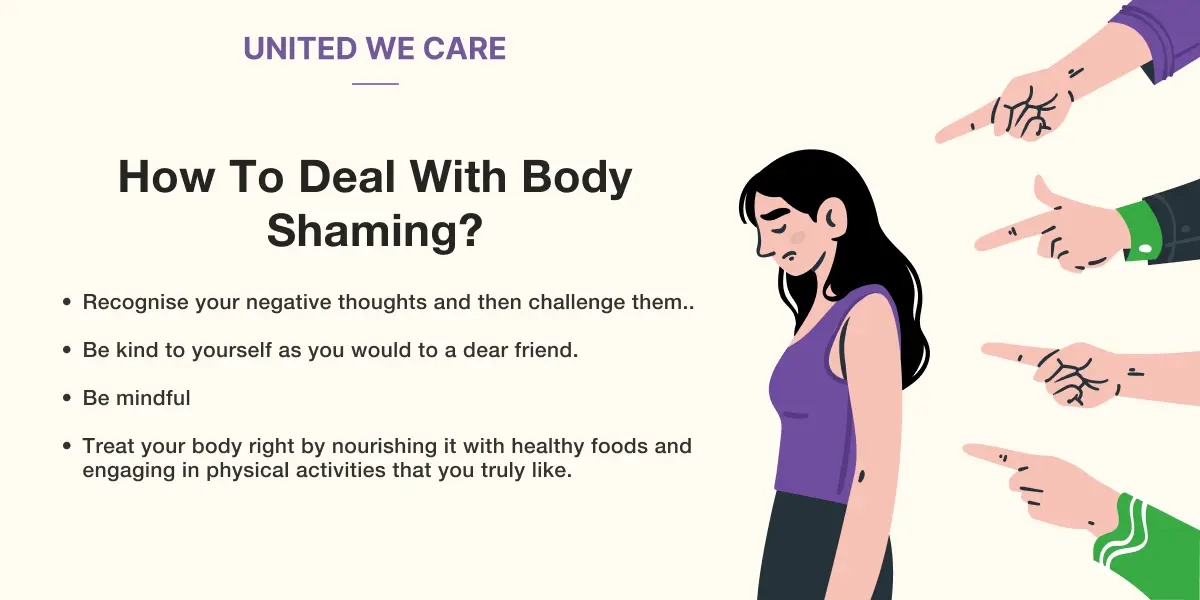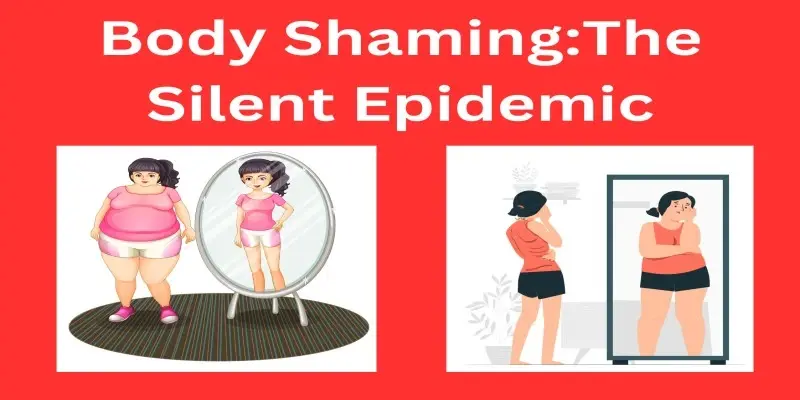Introduction
Have you ever gone to great lengths to hide parts of your body that you felt were “unflattering”? Or has anyone ever made an unsolicited critical remark on your physical appearance? Both of these scenarios fall under the umbrella of “body shaming,” with each having a different source for this behavior.
Slim and toned bodies, symmetrical and balanced facial features, and a youthful appearance- these are some of the most desired physical appearances in our society, with many other kinds of diverse appearances being labeled as unacceptable.
With society historically favoring these physical appearances and social media flooding us with an idea of what “ideal” bodies are supposed to look like, body shaming has become a silent epidemic that deeply affects our mental health.
In this blog, we’ll dig deeper into the roots and sources of this behavior, what it can do to your mental health, and how to navigate through a situation involving body shaming.
What is body shaming?
By definition, body shaming is the act of being critical of your own or other’s physical appearance.[1] But why is there a culture of shaming bodies?
In the 20th century, the fashion, entertainment, beauty, and media industries glorified certain kinds of physical appearances for multiple reasons, such as:
- Preferences of certain appearances due to what they represent culturally and historically, such as fairness of complexion being associated with a higher social status.[2]
- To create a demand and drive the sales of their fashion and beauty products, which requires people to use these products and services to achieve a particular standard of physical appearance.
- Western standards of beauty, such as thinness, are considered the hallmark of globalization.
In a broader sense, body shaming can be considered a result of societal and media trends. However, this behavior can manifest in two ways:
Internal sources:
- Cultural norms or the way your family perceives an ideal look can make you believe that you must look a certain way.
- Your critical thoughts about your body results in negative self-talk, constantly comparing yourself to others, or having unrealistic standards of appearance for yourself.
- If you have low self-esteem or a history of mental health conditions such as body dysmorphic disorder (BDD) or eating disorders, you may be more likely to have a negative image of your body.
External sources:
- Unsolicited comments from others, even strangers, on your height, weight, shape, or skin. People who engage in direct body shaming of others might also have issues with their own self-esteem and insecurities.[3]
- There is pressure to fit into communities that emphasize you looking a certain way, such as entertainment, athletic, wellness, and ethnic communities, and even certain professions, such as hospitality.
- Overexposure to media and advertisements that only promote a certain, restricted set of physical appearances makes you feel that you must either fall into that set or keep striving to achieve those unrealistic standards.
Does Body Shaming Harmful Affect Your Mental Health?
Body shaming can have significant negative impacts on your overall well-being. This behavior, whether internal or external, can make you:
- Believe that your worth is determined by the way you look, which can result in low self-esteem when you can’t meet certain standards of appearance.
- Mentally and emotionally drained from all your negative self-talk, which in some cases can result in anxiety, depression, BDD, and eating disorders.
- Resort to unhealthy coping mechanisms such as extreme diets or exercise, and even substance use to cope with your negative feelings about your body
- Withdraw from social engagements because you feel ashamed of the way you look or an environment of mistrust in your relationships because of how the other person is attacking you.
How Do You Respond To Body Shaming?
If someone is body shaming you with their hurtful remarks, you can respond to this situation by:
- Clearly, letting them know that their remark is not appreciated and what topics aren’t up for discussion with you.
- Not attacking them back with a remark that body shames them. This might be tempting, but doing so will only escalate the situation.
- If this is a person you know and care about, you can express your feelings about how their remark makes you feel. You can use “I” statements to communicate this.
- If the person seems to be genuinely unaware of the impact of their remarks, you may educate them on why body shaming is so harmful.
- You may need to reevaluate your relationship if the person is repeatedly body-shaming you despite you drawing boundaries.
How To Deal With Body Shaming?
If it’s you who is being critical of your physical appearance, you must:

- Recognize your negative thoughts and then challenge them by asking yourself if they’re based in fact or just societal standards. If it’s the latter, you must remind yourself that those standards are unattainable, and it’s not on you to achieve them.
- Be kind to yourself as you would to a dear friend. You may also practice positive affirmations such as “I unconditionally accept and love myself just as I am,” “I am thankful for my body’s strength,” etc.
- Be mindful of the content you are consuming on social media. If there are pages that make you feel bad about your body, unfollow them. Actively engage with creators who support body positivity.
- Treat your body right by nourishing it with healthy foods and engaging in physical activities that you truly like.
Conclusion
Body shaming is criticizing yourself or others based on their physical appearance. This behavior has its roots in cultural norms and has become much more rampant due to the propaganda of fashion, entertainment, beauty, and media industries. You may be body shaming yourself by engaging in negative self-talk, comparing yourself to others, or the unrealistic beauty standards portrayed online. If you are experiencing body shaming externally, it may be in the form of direct unsolicited comments, the emphasis on appearance put by certain communities, or the pressure to fit in with current social media trends of beauty. Challenging your own negative thoughts and drawing boundaries with people who are body shaming you can be some effective ways to deal with this behavior. Book a session with one of our mental health experts, who can help you cope better with body shaming. At United We Care, we offer the most appropriate, clinically backed solutions for all your needs for well-being.
References:
[1] Schlüter, C., Kraag, G. & Schmidt, J. Body Shaming: an Exploratory Study on its Definition and Classification. Int Journal of Bullying Prevention 5, 26–37 (2023). https://doi.org/10.1007/s42380-021-00109-3. Accessed: Nov. 19, 2023
[2] Nagar, I. (2018). The Unfair Selection: A Study on Skin-Color Bias in Arranged Indian Marriages. SAGE Open, 8(2). https://doi.org/10.1177/2158244018773149. Accessed: Nov. 19, 2023
[3] Mimi Sofiah Ahmad Mustafa, Ida Rahayu Mahat, Mohd Ab Malek Md Shah, Nor Aishah Mohd. Ali, Rosilawati Sultan Mohideen, Sulaiman Mahzan, “The Awareness of the Impact of Body Shaming among Youth,” 2022. [Online]. Available: https://d1wqtxts1xzle7.cloudfront.net/92190507/the-awareness-of-the-impact-of-body-shaming-among-youth-libre.pdf. Accessed: Nov. 19, 2023










